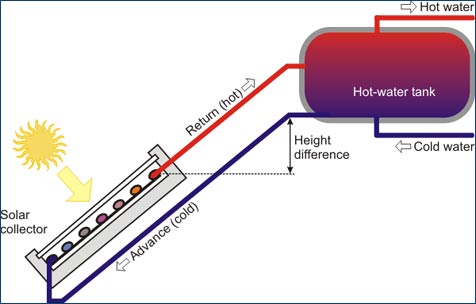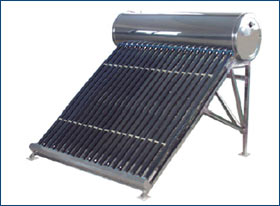|
If you are new to Solar, we are pretty sure that you
have heard of all sorts of different terminology, and every ‘advisor’
has given you advice as to which system to use and which not to use.
The truth is that all the systems are very good and very efficient when
used within their particular design parameters.
Each Button serves to explain either the difference between two systems,
or a particular type of system.
We install all of these systems in accordance with the BEST
POSSIBLE OUTCOME FOR THAT PARTICULAR INSTALLATION AND OUR CLIENT’S
CIRCUMSTANCES.
So once you have had a quick, read, contact us for a FREE NO
OBLIGATIONS QUOTE!
Geyser - The Water Tank
Solar Collector - The Flat Panel OR the Vacuum Tubes
which you see on the roof
This is the engine of the Solar System and is what traps the Sun’s
rays and converts them to useable heat to heat the water in the geyser.
Timer - In order to claim Eskom’s Rebate all
ESKOM approved systems come with a timer. This allows you to control
when your thermostat checks the water temperature in the geyser and
either turns on or off the geyser element.
Controller - This controls the pump which circulates
the water from the geyser to the collector and back to the geyser in.
It has temperature probes in the geyser and the collector, and only
circulates water when the collector is 8° warmer than the geyser.
This makes the split system extremely efficient. In addition the controller
has a timer which controls the element as per above Timer.
DIRECT means that the Solar Collector heats the water directly and this
flows back into your geyser and then out to your tap.
INDIRECT means that the Solar Collector heats another fluid (usually
Glycol) which flows into a heat exchanger where this heat is transferred
to the water. The water which comes out of your tap is not heated directly
by the Solar Collector, but rather by this fluid.
Due to their complexity, the Indirect systems are therefore slightly
more expensive.

Thermosiphon (Direct)
The Thermosiphon system is installed with the geyser always 300mm higher
than the top of the collector panel.
In the direct system as shown above, the water from the geyser circulates
through the panel using basic physics – hot water rises, and cold
water sinks. In this instance the Solar Collector can either be a Flat
Plate Collector OR Vacuum Tubes.
In some cases the geyser can still be placed higher than the panel inside
the roof, but this is usually only possible in new build projects.
Separated System (Direct) or Pumped
In separated systems a pump is used to circulate the water from the
geyser to the panel. If the height difference between the geyser and
the Solar Collector is less than 6meters a 12V pump with a photovoltaic
panel can be used. If this is greater than 6meters a 220V pump is used.
In both cases a Digital controller is used to ensure that only water
which is hotter than the geyser is circulated from the Solar Collector.
1Collector
2Digital Controller
3Pump- 12V or 220V
Split or separated systems allow you to place the geyser
inside the roof and the panel on a sunny north facing roof.
The Geyser is fitted with an electrical element and a timer.
Integrated Low Pressure Systems
Vacuum tube pipes are inserted into the main tank directly with a seal
which prevents the water from running out. Water flows directly into
the tubes and the sun’s energy is transferred to the water. The
hot water rises in the tubes and is replaced by cooler water siphoning
out of the tank - automatically circulating the water.

Solar equipment can be confusing. If you would like to read more about solar equipment and how it works, try www.solarfacts.co.za |



